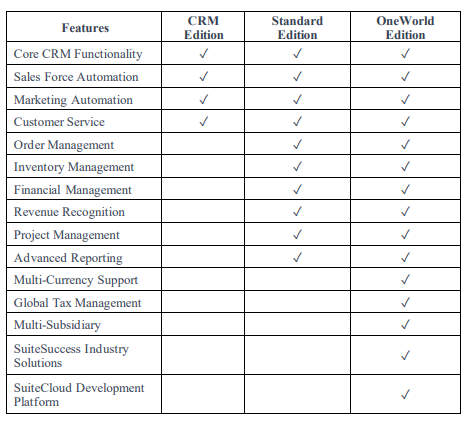Are you searching for a comprehensive and scalable business management solution? Look no further than NetSuite! With its powerful suite of cloud-based applications, NetSuite offers a wide range of editions and levels tailored to meet the unique needs of businesses of all sizes and industries. In this blog, we will explore the various NetSuite editions, uncover their key differences, and help you make an informed decision about which edition is right for your organization. Let us dive in!
Customer Relationship Management (CRM), Standard, and OneWorld are the three current NetSuite editions available to your company.
Here, we will walk you through each option, which has different advantages for your company depending on the edition.
NetSuite editions
NetSuite CRM
Companies who want to utilize NetSuite to manage relationships with customers should adopt the CRM edition. This edition, which shares many similarities with Salesforce.com, is intended to serve as a starting point for sales and marketing automation. It is the most limited of the 3 editions because it does not include accounting functions. However, it comes at a lower price point than the other editions.
Marketing automation helps you to track your campaigns quickly and can be utilised as your sole email marketing solution in your company. In this method, upsell marketing is effectively supported by historical analysis. Such analysis provides the groundwork for successful upsell marketing. It achieves this by taking control of the customer’s lifecycle, taking previous visits into account, and ensuring that the customer is directed to the correct spot.
NetSuite CRM’s e-commerce arm allows you to customise your CRM system and capture micro-interactions, while Customer Service and Support provides online self-service. This enables you to monitor crucial indicators such as renewals, customer satisfaction, and resolution metrics on real-time dashboards. There are also automated business processes with case management, and the software supports routing and tracking support cases by issues, case type, partner, product, or customer.
A company’s overall benefits include:
- A more efficient lead-to-cash process.
- Productivity has increased because of a 360-degree view of customers.
- Forecasting, upselling, and commission management all contribute to enhanced sales performance.
- Global sales and service organizations must be managed.
Standard
The Standard edition is in the middle of the road in terms of pricing and features, falling somewhere between CRM and OneWorld. It is the most widely used of the three editions, which means that the Standard edition is what most businesses use. The Standard edition features robust financials, inventory management, and everything that comes with the CRM edition. The only major limitation of the Standard edition is that it cannot be utilised by companies that have multiple subsidiaries.
NetSuite OneWorld
NetSuite OneWorld is NetSuite’s most comprehensive edition. For businesses with multinational operations or subsidiaries, NetSuite OneWorld is the ultimate solution. It extends the power of NetSuite ERP (Enterprise Resource Planning) by adding global financial consolidation, multi-currency management, and multi-language capabilities.
NetSuite OneWorld enables you to manage multiple aspects of your global, multi-company business. Financials, customers, Services Resource Planning (SRP), business intelligence, tax and compliance management, and e-commerce can all be managed.
This edition can handle all a company’s global transactions and operations. Financials are the system’s backbone. NetSuite OneWorld Financials is an amazing cloud fiscal management application for any business. This allows users to customise how they see the data, such as currency, language, and taxation.
NetSuite OneWorld provides out-of-the-cloud pre-configuration to over 50 countries, and NetSuite can provide a built-in tax engine that your company can modify to meet its specific needs.
Here is a comparison table highlighting the key features and capabilities of NetSuite’s Customer Relationship Management (CRM), Standard, and OneWorld editions:

NetSuite levels
Once you have decided which edition is best fit for your company, it is time to select a level. Again, there are three primary levels to choose from.
Light Edition
The Light Edition (LE) is intended for small businesses with fewer than 10 users and 50 employees.
Mid-Market Edition
The Mid-Market Edition (MME) is coming next. There is no stated minimum number required for this level, however it is realistically oriented towards firms with 15-1000 employees. This is a more expensive option that excludes a substantial number of small businesses. The key difference between LE and MME is that with MME, you can add other modules to your package, such as E-commerce and Inventory.
Enterprise Edition
The Enterprise Edition level is a step up and is intended for enterprises with more than 1,000 employees.
These levels influence how you interact with NetSuite as a company and what kind of support you can obtain. However, the cost is heavily influenced by levels. On a per-user per-month basis, there is a little pricing difference between LE and MME, but a large price difference between MME and EE.
It is easy to become confused between editions and levels, but remember that your edition comes first, and your level is determined by the size of your company. For example, if you choose the CRM Edition only for customer relationship management, you will choose one of the three Levels listed above based on the size of your organisation as determined by a combination of the number of users and the number of employees.
With NetSuite’s cloud-based approach, you can enjoy the benefits of a fully integrated and scalable ERP solution without the hassle of managing hardware or software updates. Plus, you will have access to regular product updates, ensuring that you stay ahead of the curve with the latest features and innovations.
Ready to take your business to new heights? Contact us today to learn more about NetSuite and how it can transform your organization into a cloud machine, ready to tackle the challenges of today’s dynamic business landscape.
Make sure you do not make any mistakes when implementing the products. You can go through our blog Avoid These Common Mistakes During NetSuite Implementation to make sure you choose the right partner for your NetSuite implementation.
Leave A Comment